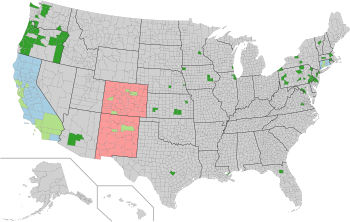Our website is made possible by displaying online advertisements to our visitors.
Please consider supporting us by disabling your ad blocker.
Sanctuary city
This article needs to be updated. (November 2024) |

A sanctuary city is a municipality that limits or denies its cooperation with the national government in enforcing immigration law.
A city's council and mayor will usually declare itself a sanctuary city and subsequently enact measures and policies that are welcoming and favorable to illegal immigrants. Sanctuary cities undertake the responsibilities of receiving and processing an influx of illegal immigrants, and providing services and resources for them to acclimate and live in the country and communities in which they arrive.
Proponents of sanctuary cities cite motives such as reducing illegal immigrants' fears of deportation, separating of illegal immigrant families, reporting crimes, using health and social services, and enrolling their children into public school.
Opponents of sanctuary cities argue that they undermine the rule of law by not cooperating with federal immigration authorities. They also highlight concerns about public safety, pointing to cases where illegal immigrants involved in crimes were released instead of being handed over to immigration authorities. Critics claim that sanctuary cities act as magnets for illegal immigration, attracting more people to enter unlawfully. They also argue that these cities place a strain on local resources, as illegal immigrants may access public services like healthcare, housing, and education.
Some studies on the relationship between sanctuary status and crime have found that sanctuary policies either have no effect on crime or that sanctuary cities have lower crime rates and stronger economies than comparable non-sanctuary cities. In 2016 the Washington Post reported that "decades of research actually shows that immigrants – whether legal or illegal – tend to have lower crime rates.[1][2] Similarly, a 2017 report by the Center for American Progress concluded that, "Statistical analysis illustrates that across a range of social and economic indicators, sanctuary counties perform better than comparable nonsanctuary counties."[3] A 2017 'Review of the Research on “Sanctuary Cities” and Crime' in Sociology Compass concluded that, 'The few empirical studies that exist illustrate a “null” or negative relationship between these policies and crime.'[4]
Sanctuary city policies substantially reduce deportations of illegal immigrants who do not have criminal records, but have no impact on those who have violent criminal records.[5] Opponents of sanctuary cities argue that cities should assist the national government in enforcing immigration law. Supporters of sanctuary cities argue that enforcement of federal law is not the duty of localities, and that law enforcement resources can be prioritized towards better purposes.[6]
European cities have drawn inspiration from the sanctuary movement in American cities. However, the term "sanctuary city" in Europe generally refers to cities committed to supporting documented refugees and asylum seekers, not illegal immigrants.[7][8] Over 80 towns and cities across the United Kingdom adopt policies aimed at fostering community connections, raising awareness, and building cultural ties to support these groups. Glasgow and Swansea have become noted sanctuary cities.[9][10][11]
- ^ Collingwood, Loren; Gonzalez-O'Brien, Benjamin & El-Khatib, Stephen (October 3, 2016). "Sanctuary cities do not experience an increase in crime". Washington Post.
- ^ Martínez, Daniel E.; Martínez-Schuldt, Ricardo; Cantor, Guillermo (2018). "Sanctuary Cities" and Crime. pp. 270–283. doi:10.4324/9781317211563-21. ISBN 9781317211563.
- ^ "The Effects of Sanctuary Policies on Crime and the Economy". Center for American Progress. January 26, 2017.
- ^ Martínez, Daniel E.; Martínez-Schuldt, Ricardo D.; Cantor, Guillermo (2017). "Providing Sanctuary or Fostering Crime? A Review of the Research on "Sanctuary Cities" and Crime". Sociology Compass. 12: e12547. doi:10.1111/soc4.12547. ISSN 1751-9020.
- ^ Cite error: The named reference
:6was invoked but never defined (see the help page). - ^ Cite error: The named reference
Phamwas invoked but never defined (see the help page). - ^ Van Steenbergen, Marishka (May 10, 2012). "City of Sanctuary concern for welfare of asylum seekers as housing contract goes to private security firm". The Guardian.
- ^ Lippert, Randy K.; Rehaag, Sean (2013). Sanctuary Practices in International Perspectives: Migration, Citizenship, and Social Movements. Routledge. ISBN 978-0-415-67346-4.
- ^ Nicoll, Vivienne (August 25, 2014). "City offering sanctuary to refugees from Syria". Evening Times.
- ^ "Swansea City of Sanctuary – Building a culture of hospitality for people seeking sanctuary". swansea.cityofsanctuary.org. Retrieved October 27, 2018.
- ^ Forrest, Adam (June 14, 2010). "Sanctuary City". The Big Issue. Archived from the original on March 8, 2021. Retrieved November 25, 2016.
Previous Page Next Page


